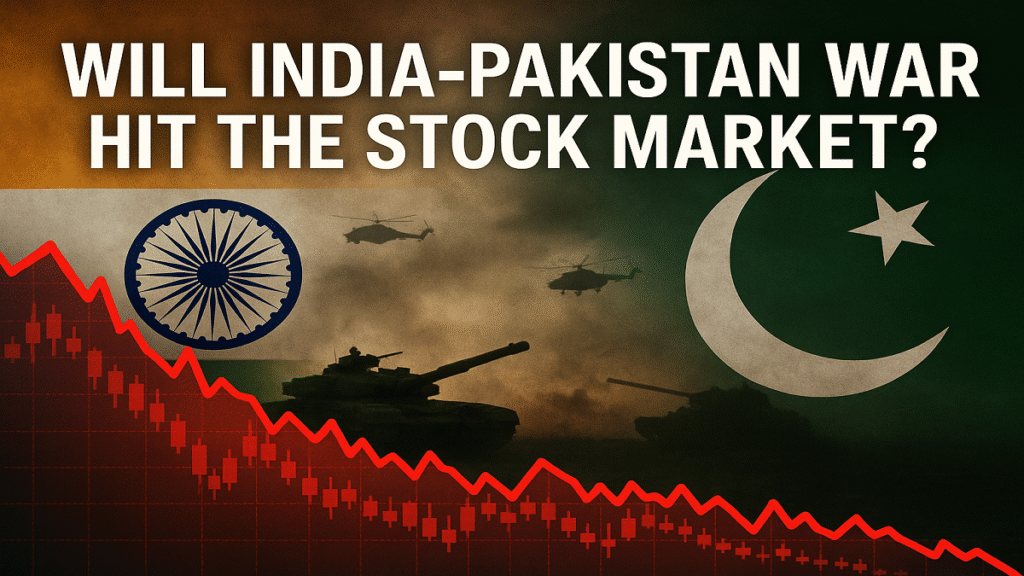India Pakistan Tensions (Geo-political) have long been a critical factor influencing economic stability in South Asia. As two nuclear-armed neighbors with a history of conflict, their strained relations can ripple across global markets, affecting investors worldwide. The recent escalation of geopolitical tensions between India and Pakistan, particularly following the April 22, 2025, terrorist attack in Pahalgam, Indian-administered Kashmir, has heightened concerns for investors.
With India launching missile strikes on May 7, 2025, dubbed “Operation Sindoor,” and Pakistan vowing retaliation, the situation poses significant risks to financial markets. This blog post examines how these developments affect your investments and provides strategies to navigate the volatility, incorporating insights from recent events.

Background on Recent India Pakistan Tensions
On April 22, 2025, gunmen killed 26 people, mostly Indian tourists, in Pahalgam, marking the deadliest attack in Indian territory since 2008. India accused Pakistan of harboring militants, specifically linking the attack to groups like Jaish-e-Mohammed and Lashkar-e-Taiba, a claim Pakistan denies. In response, India launched “Operation Sindoor” on May 7, striking nine sites in Pakistan and Pakistan-administered Kashmir, targeting alleged terrorist infrastructure.
Pakistan reported 31 civilian deaths and labeled the strikes an “act of war,” vowing to retaliate. Both nations have since engaged in drone attacks, shelling along the Line of Control (LoC), and diplomatic measures like suspending trade and the Indus Waters Treaty.
How Recent Escalations Affect Investments
1. Stock Market Volatility
Geopolitical flare-ups between India and Pakistan often lead to sharp declines in their respective stock markets, such as India’s BSE Sensex and Pakistan’s PSX. For example, after the 2019 Balakot airstrike, the Sensex dropped significantly due to fears of escalation. Investors in Indian or Pakistani equities may face sudden losses during such events.
The ongoing conflict has triggered significant volatility in Indian and Pakistani stock markets. After India’s strikes, the BSE Sensex and Pakistan’s PSX experienced sharp declines due to fears of further escalation. For instance, India’s strikes on May 7 led to immediate market drops as investors reacted to the risk of a broader conflict. Sectors like IT, consumer goods, and banking are particularly vulnerable, while defense stocks, such as Bharat Electronics, may see gains due to increased government spending.
Note: As at the time of writing this blog, Sensex is down by 720 points, Nifty is down by 230 points and PSX (Pakistan Stock Exchange) has almost crashed.
Impact to consider: Investors in equities may face short-term losses, but defense and energy sectors could offer opportunities during heightened tensions.
2. Currency Depreciation
The Indian Rupee (INR) and Pakistani Rupee (PKR) have weakened as foreign investors withdraw capital amid uncertainty. Pakistan’s fragile $350 billion economy, already strained by a recent IMF loan program, faces further pressure from the conflict, exacerbating PKR depreciation. A weaker currency increases import costs, driving inflation and impacting companies reliant on foreign inputs.
Impact: Investors holding INR- or PKR-denominated assets may see reduced returns when converting to stable currencies like the US Dollar.
3. Trade and Supply Chain Disruptions
India and Pakistan have frequently imposed trade restrictions during conflicts. For instance, after the 2019 Pulwama attack, India raised customs duties on Pakistani goods, effectively halting bilateral trade. Such disruptions can affect industries like textiles, agriculture, and pharmaceuticals, which rely on cross-border supply chains.
The suspension of trade between India and Pakistan, coupled with the closure of key border crossings like Attari, has disrupted supply chains. Industries such as textiles, pharmaceuticals, and agriculture, which rely on cross-border trade, face delays and cost increases. Pakistan’s airport closures in Lahore, Karachi, and Sialkot on May 8 further complicate logistics.
Impact: Companies operating in or sourcing from these countries may experience reduced profitability, affecting stock performance and investor returns.
4. Foreign Direct Investment (FDI) Decline
The escalation has deterred FDI in both nations. India’s strikes and Pakistan’s retaliatory measures, including drone attacks on May 8, signal heightened risks, prompting multinational corporations to delay or cancel investments. Pakistan’s economic recovery efforts, tied to its IMF program, are particularly vulnerable.
Impact: Reduced FDI can slow economic growth, depressing stock valuations and limiting opportunities in emerging markets.
5. Global Market Ripple Effects
India’s role in global IT and pharmaceuticals and Pakistan’s textile exports mean disruptions can affect international markets. The conflict has also raised oil price concerns due to regional instability, impacting energy-dependent economies. Global index funds or ETFs with exposure to emerging markets may see indirect losses.
Impact: Investors in diversified portfolios may face broader market volatility stemming from South Asian instability.
Strategies to Mitigate Investment Risks
Dos and Donts
- Avoid Panic Selling: Market corrections are often temporary.
- Stick to SIPs: Continue your Systematic Investment Plans to benefit from rupee cost averaging.
- Diversify Your Portfolio: Include a mix of equities, debt, gold, and global funds.
- Monitor but Don’t Overreact: Stay updated but don’t make impulsive decisions based on headlines.
To safeguard your portfolio amid these tensions, consider the following:
- Diversify Globally: Reduce exposure to South Asian markets by investing in stable economies like the US or Europe.
- Focus on Defensive Assets: Prioritize sectors like healthcare or utilities, which are less affected by geopolitical shocks.
- Stay Informed: Monitor developments, such as Pakistan’s vowed retaliation or India’s ongoing operations, through reliable sources like Reuters or BBC.
- Hedge Currency Exposure: Use currency-hedged ETFs to mitigate losses from INR or PKR depreciation.
- Adopt a Long-Term View: Temporary escalations, like those following the 2019 Pulwama attack, often subside through diplomacy, as seen with Pakistan’s release of an Indian pilot. Focus on fundamentally strong companies.
Opportunities and Weaknesses Amid the Crisis
Despite the risks, certain opportunities emerge:
- Defense Stocks: Indian firms like Hindustan Aeronautics may benefit from increased military budgets.
- Safe-Haven Assets: Gold and US Treasuries typically gain during geopolitical uncertainty.
- Undervalued Stocks: Market corrections may create buying opportunities for resilient companies in India’s IT or pharma sectors.
Sectors most likely to take a hit include
- Oil and Energy: Crude oil prices can spike if tensions disrupt regional trade routes or diplomatic ties.
- Export-driven sectors: A volatile rupee and trade policy uncertainties can hurt IT, textile, and pharmaceutical exports.
- Tourism and Aviation: These sectors are typically among the first to be impacted by perceived instability.
Conclusion
The India-Pakistan conflict, intensified by the April 22 Pahalgam attack and India’s May 7 strikes, poses significant risks to investments through market volatility, currency depreciation, and supply chain disruptions. By diversifying, hedging risks, and staying informed, investors can navigate this uncertainty. Opportunities in defense stocks and safe-haven assets may also arise. Consult a financial advisor to tailor strategies to your portfolio.
Disclaimer: Investments carry risks, and geopolitical events are unpredictable. Conduct thorough research or seek professional advice before making decisions.
Yet to Start Investing?
It is never too late! Remember what Rothschild told.
“Buy when there’s blood in the streets,”

